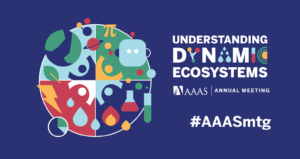 Significant contributions were provided by CCC Senior Program Associate, Khari Douglas.
Significant contributions were provided by CCC Senior Program Associate, Khari Douglas.
The virtual AAAS 2021 meeting took place February 8th – 11th, 2021 and included a highly topical session titled Computing, Artificial Intelligence, and Societal Impacts: An Inflection Point. The February 10th event included former Computing Research Association (CRA) board member Moshe Vardi (Rice University), Computing Community Consortium (CCC) Executive Council member Suresh Venkatasubramanian (University of Utah), Seny Kamara (Brown University), and Dan Reed (University of Utah) as speakers. This session aimed to show how the computing revolution has democratized access to information and disrupted entire economic sectors, with associated human effects, both positive and negative. Likewise, this computing revolution has shifted the way that humans, algorithms, and machines make decisions, and it has raised important questions of ethics and fairness for a wide range of computing-mediated transitions and decision processes.
Seny Kamara started the session by asking, “who benefits from computing technology?” Corporations, governments, and venture capital all benefit from the work of computer scientists, but Kamara cautioned, can the same thing be said of individuals, particularly those who belong to marginalized communities? If marginalized communities are not benefiting from computing technology, who is responsible for thinking about these groups and making sure that they will become beneficiaries? Kamara argued that this issue requires a complete rethinking of computer science research, particularly with regards to algorithms, security, privacy, robotics, and human-computer interaction, because currently many researchers are oblivious to the needs of marginalized groups.
Kamara also said that part of the problem is how we have educated computer scientists in the past: “We have taught them to view the field as a tool building field. We need to give our students a broader impact of what CS is… since the field is very homogenous.” Students must be educated in “soft-sciences” such as policy, society, history, etc., in order to be able to consider the impact their technologies will have on the world. This, as Venkatasubramanian remarked, is slowly starting to appear in the mindsets of current CS students. Venkatasubramanian said that his students who were raised with social media such as Facebook and Twitter seem to be more aware of the negative consequences that can emerge from these technologies and are demanding that we expand our vision of the field.
Moshe Vardi compared the current situation in technology to the Orson Scott Card novel, Ender’s Game. In the novel, a group of children believe they are playing a series of computer-simulated battles, but at the end of the novel it is revealed that battles were actually real and a real civilization has been destroyed. Vardi said that this reflects the current state of computing technology — many people believe that all they are doing is playing with computers, but the actions they take have material impacts on the world, many of which can cause real world destruction and consequences.
This session highlighted the fine line between benefits and disadvantages of technology. It is not just a tool building field, it is a highly interdisciplinary, highly impactful, and highly valuable field that has the potential to be very harmful or very good, and we are at a point where all of these aspects need to be considered.
This is just the beginning of recognizing the problems and making the broad commitment to address it. CCC’s former Fairness, Accountability, Disinformation, and Explainability (FADE) Task Force, which existed from 2019-2020, examined the overlapping areas of fairness, accountability, disinformation, and explainability within algorithms, big data, and the Internet. This year’s newly launched CCC Task Force on Radically Responsible Computing is planning to continue this work and focus on the “fairness, privacy, and responsibility for the negative outcomes of algorithms.” CCC Council member Odest Chadwicke Jenkins (University of Michigan) was recently interviewed by the New York Times about his thoughts on the AI field’s apparent failure to make systems that are accurate for everyone.









